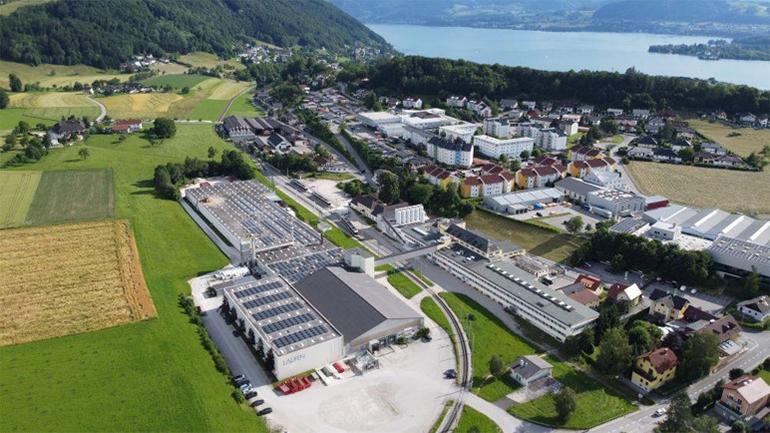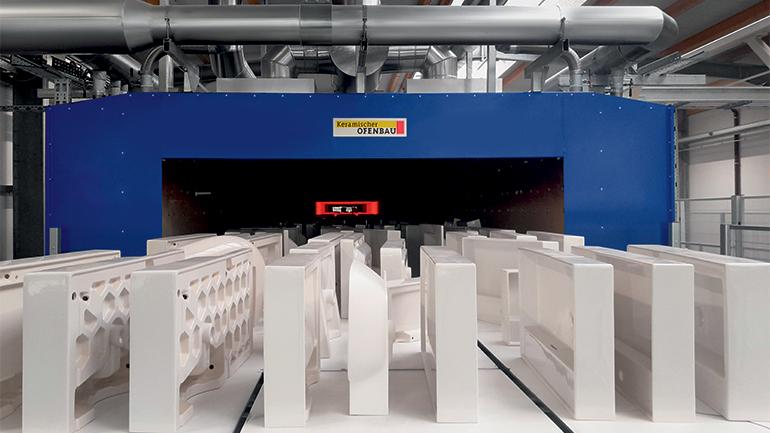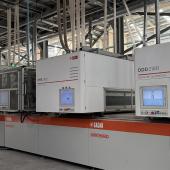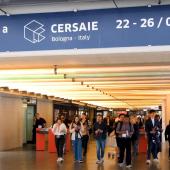Roca Group’s decarbonisation efforts focus on process electrification
After the successful start up of the first electric kiln at the Laufen plant in Austria, plans are already in place to install the next five machines at different Roca Group factories by the end of 2025.

The Spanish sanitaryware multinational Roca Group has successfully completed an ambitious four-year research project in collaboration with the German kiln manufacturer Keramischer OFENBAU with the shared goal of creating the world’s first zero-emission ceramic sanitaryware factory, demonstrating that a sustainable alternative to fossil fuels can be found even for energy-intensive industries like ceramics. The first step in this pioneering venture involved successfully developing and starting up the first electric tunnel kiln capable of producing complex, high-quality sanitaryware.
Out of Roca Group’s various production units located on five continents, the state-of-the-art Laufen facility in Gmunden, Austria was selected for the introduction of this groundbreaking kiln, which has been in operation since last November.
The Gmunden site was chosen because the factory is already electrified and self-generates 40% of its electricity needs through a rooftop photovoltaic system, while the remaining 60% consists of externally sourced green-certified electricity.
“It was no surprise that it was the Austrian team who came up with the idea of developing a solution for electrifying the firing process,” says Carlos Velazquez, director of Sustainability & Institutional Relations at Roca Group. “But there’s also another reason why the Gmunden site proved perfect for this project,” he continues. “This facility is used to produce Laufen’s most complex items, so if the new technology works here, then it will work for any other kind of product. Moreover, the results achieved so far are excellent. The quality of production has exceeded our expectations, especially in terms of glaze behaviour inside the kiln, which has resulted in greater colour intensity.”
The electric kiln now in operation in Gmunden (patent pending at the European Patent Office) has proved to be highly efficient and automated. It operates at a firing temperature of 1220°C, achieves double-digit energy savings compared to an equivalent gas kiln and runs on 100% renewable energy. It is capable of firing complex sanitaryware items as well as structural and technical ceramics and tableware.
Roca Group embarked on the development of the new electric kiln in 2019 with an investment of around €10 million. Half of this figure was allocated to equipping the Gmunden site with the necessary facilities and a new transformer station, while the other half went towards financing the design and construction costs of the pilot kiln. Meanwhile, the Spanish group’s venture arm Roca Group Ventures acquired a 66% majority stake in Keramischer OFENBAU to support its efforts to develop and market electric kilns for the ceramic industry. While the German business will remain fully independent, this long-term collaboration will strengthen both companies’ innovation capabilities and help them work together towards the sustainable ceramic industry of the future.
“We have a long-term goal to decarbonise our operations and have been working hard to find solutions that will help us achieve this,” comments Roca Group’s CEO Alberto Magrans. “This new pan-European partnership not only helps us on our way to net zero but is also a clear step forward for the industry as a whole.”
Plans are already in place to install the next five electric kilns at different Roca Group production units. The first three are already at an advanced stage of construction and will be started up later this year in three of the group’s plants in Europe, says Magrans. The other two are planned for 2025 in Spain, one at the facility in Gavà (Barcelona) and the other at Cerámicas Gala in Burgos, and will benefit from public funding under the Strategic Projects for Economic Recovery and Transformation (PERTE) programme.
Roca Group invested a total of €50 million in sustainability between 2021 and 2023 and has earmarked a further €26 million for 2024.
The roadmap to sustainability
The start-up of the new kiln in Gmunden last November and Roca Group’s investments in electrification in general are key elements of its broader sustainability strategy, particularly its commitment to achieving carbon neutrality by 2045.
This strategy gained momentum with the appointment of Alberto Magrans as Group CEO in 2019 and the formation of a multidisciplinary team responsible for implementing initiatives as part of a roadmap consisting of eight workstreams (Decarbonization, Sustainable Materials & Circularity, Sustainable Products, People Development, Commitment to Society, Sustainable Supply Chain, Sustainable Logistics and Sustainable Promotion).
By the end of 2022, the Group had made significant strides towards decarbonisation and circularity, marking a notable improvement from 2018 figures: a 39% decrease in CO2 emissions (18% lower than in 2021), a 47% reduction in water consumption (28% lower than in 2021) and a 46.5% decrease in waste generation (20% less than in 2021). The Group also tripled its renewable energy production capacity, with the 33,000 installed solar panels now meeting approximately 25% of its total energy needs.
These accomplishments earned Roca Group the EcoVadis gold medal in December 2023, positioning it among the top 3% of the more than 100,000 companies from 175 countries assessed by EcoVadis.
Roca Group’s next goal is to reduce its CO2 emissions by a further 42% by 2030 compared to 2021 levels. It plans to equip all 79 of its factories with EMS (Energy Management Systems) and to proceed with electrification of kilns and dryers in its sanitaryware production facilities.
Did you find this article useful?
Join the CWW community to receive the most important news from the global ceramic industry every two weeks























